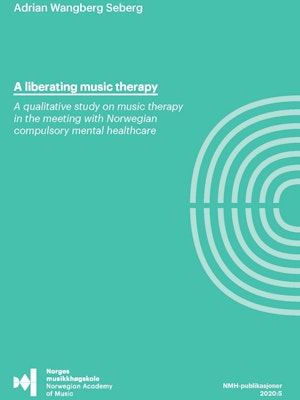This study asks what music therapy can be for service users within compulsory mental healthcare. As a humanistic and recovery-oriented approach, Norwegian music therapy may be viewed as part of a social-academic movement that aims to enhance the participants’ possibilities for action. Norwegian work ethical guidelines stress that music therapists should support self-determination for the service user. These values, however, are challenged when working within cultures of involuntary treatment.
Today we witness changes within the mental health care in Norway regarding both compulsory treatment and the emphasis on alternatives to medications. At the same time, music therapy is on its way to being established within mental healthcare across the country. It is essential that music therapists are educated about coercion and aware of their attitudes when they are positioned within discourses historically characterised by different coercive measures.
Previous research on user experiences points to self-determination and freedom within music therapy as important aspects of music therapy within mental health care and in adjacent practices. Also, previous research teaches us that people with low motivation for treatment may profit from music therapy and that music therapy can be experienced as something else than other treatments. The overarching research question for this study is: ‘What can music therapy be for service users within compulsory mental healthcare?’
The researcher works through a humanistic perspective on music therapy, which includes notions from recovery-oriented music therapy, resource-oriented music therapy, and community music therapy. A postmodernism-informed critical perspective has influenced this study. Especially Foucault’s notion of discourse has impacted the author’s understanding of attitudes and practices within modern mental healthcare; the status quo of mental healthcare is not necessarily the result of a knowledge-based approach but also a result of ruling discourses.
Dis/ability studies is a perspective that seems to go well with both the humanistic perspective on music therapy and a postmodernism-informed critical understanding of the community; this perspective also aligns with the Convention on the Rights for Persons with Disabilities that is used to point at the relationships between society and individual health, and to stress the importance of maintaining human rights for persons with mental health challenges. Notions from critical psychiatry and notions about positive and negative liberties are also part of the researcher’s foundation for discussing music therapy within compulsory mental healthcare.
The design of the study is a qualitative one. The empirical material is constructed through joint interviews in which seven music therapy participations undergoing coercive mental healthcare were interviewed together with their respective music therapists. The interviews were transcribed verbatim and analysed thematically.
Three main themes were constructed through the thematic analysis:
- Voluntary music therapy
- Motivating music therapy
- Health-promoting music therapy
The participants in this study tend to regard music therapy as voluntary, although they are currently being treated involuntarily otherwise. They want access to similar activities beyond their therapy process, they want others to have the same access to music therapy, and some of the participants have taken the initiative to increase the frequency of music therapy appointments.
Some aspects of music therapy are mentioned frequently for why people want music therapy: The participants already have a close relationship with music, and they are familiar with the potential positive by-products from music and from participating in music activities; music therapy participation comes with a break from treatment, coercion, medications, sterile wards, and other service users; in music therapy, people are free to be themselves and free to explore, regardless of musical background or skill level; music therapy is a social arena for growing relationships with the therapist, as well as with peers.
Participation in music therapy can affect the recovery process in several ways: music therapy is sometimes regarded as the highlight of the week and is something to look forward to during a hard time; music therapy can help people to get going, and for some people, music therapy is the only activity in which they participate during a regular week; music therapy participation comes with meaningful experiences and a spectrum of positive emotions; sometimes taking part in music therapy helps to reduce symptoms and mental health challenges, such as anxiety and run of thoughts.
Seberg suggests the term ‘liberating music therapy’ as an answer to the initial research question of what music therapy can be for people within compulsory mental healthcare. In the description of what liberating music therapy can be, attention is drawn toward freedom-enhancing perspectives on three layers: 1) within the music therapy sessions, 2) within the recovery process, and 3) within society. These three layers are also discussed in regards to three different levels of music therapy 1) a practice, 2) a profession, and 3) an academic discipline.
Seberg argues that music therapists have the responsibility to enable a sense of freedom within the music therapy session, as well as to strive for self-determination within the mental healthcare system. As part of an academic discipline, Seberg argues, music therapists should oppose the unnecessary use of compulsory mental healthcare and support self-determination and recovery-enabling structures, both in mental healthcare and in society as a whole.
